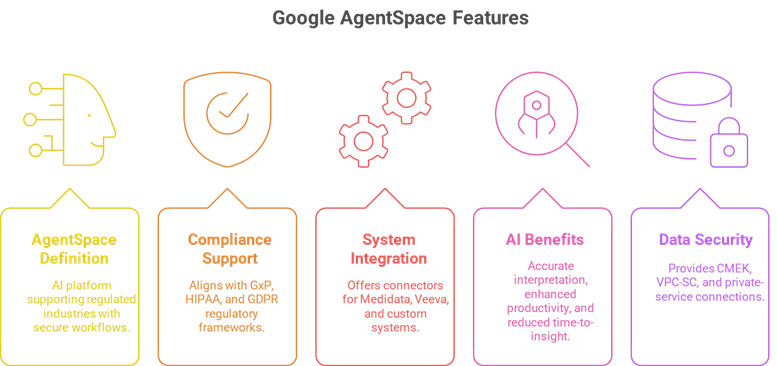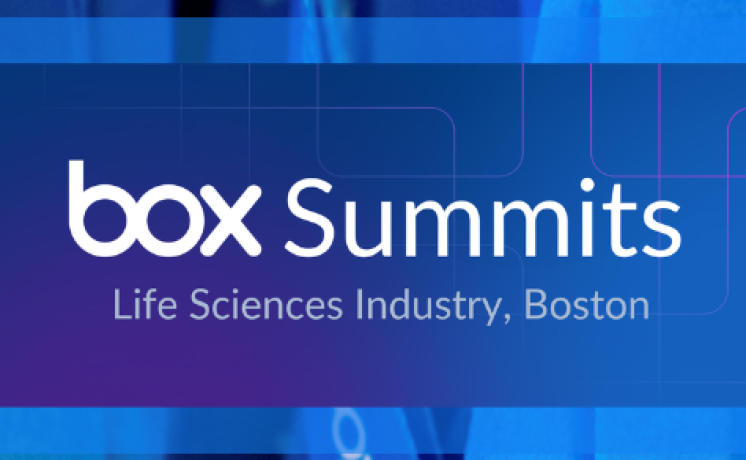Top 10 critical considerations life-science organizations must evaluate when implementing Google Agentspace
Artificial intelligence is revolutionizing every industry, and the life sciences sector is no exception. Adopting AI-driven platforms like Google Agentspace in this highly regulated domain brings both opportunity and complexity. Organizations must navigate strict compliance requirements, ensure data security, and deliver measurable returns. Google Agentspace for life sciences offers a promising solution tailored for the nuanced needs of pharmaceutical, biotech, and clinical research companies.
This article outlines the ten key priorities that life-science organizations consistently highlight when evaluating Google Agentspace, serving as a comprehensive roadmap to successful adoption.
1. Regulated-Industry Compliance
Designed and continuously aligned with GxP Quality, Compliance, and Security guidelines and regulations such as FDA 21 CFR Part 11, HIPAA (US Health Privacy), GDPR (EU Data Protection), NIST CSF (Cybersecurity Framework), NIS-2 Directive (EU Cybersecurity), EU AI Act, etc. Many of these are non-negotiable for life-science organizations. Google Agentspace aligns seamlessly with these frameworks through its support for FedRAMP and Virtual Private Cloud-Service Controls (VPC-SC). Moreover, its roadmap for GxP certification simplifies integration into validation workflows, making the Computer System Validation (CSV) process less burdensome.
Such proactive compliance features reassure quality, regulatory, IT, data protection and privacy, and cybersecurity teams that the platform can be safely and efficiently incorporated into regulated environments without compromising audit readiness or legal standards.
2. Granular Data Security & Residency
Data integrity and confidentiality are paramount in life sciences. Google Agentspace provides robust encryption at rest and in transit and support for Customer-Managed Encryption Keys (CMEK), VPC-SC, and private service connections.
What sets Agentspace apart is Google’s transparent policy of ensuring that customer data is not used to train its models. This builds significant trust, especially for companies dealing with proprietary research data or sensitive patient information, by offering strong assurances around data sovereignty and residency.
3. Auditability & Traceability
Compliance isn’t just about controls—it’s also about evidence (documentation). Agentspace offers comprehensive, immutable logs that capture every interaction. These logs track user identities, input prompts, agent versions, model configurations, and output responses.
Crucially, these detailed logs can be seamlessly exported into existing Quality Management Systems (QMS) or electronic Trial Master Files (eTMFs), simplifying both internal audits and external inspections—this high degree of traceability through leverageable assets that provide the meticulous evidence required in regulated life sciences.
4. Seamless Integration with Scientific Systems
AI adoption must integrate into the broader digital ecosystem of scientific research. Google Agentspace excels by offering out-of-the-box connectors for electronic lab notebooks (ELNs) like Benchling and LabVantage, clinical systems like Medidata and Veeva, quality platforms such as TrackWise, and enterprise resource planning (ERP) systems like SAP.
Moreover, Agentspace supports the creation of secure, custom connectors tailored to each organization’s proprietary systems—essential for IP-sensitive use cases.
5. Multi-Agent Workflow Governance
The complexity of life-science workflows demands robust governance. Agentspace delivers features like agent version control, role-based access control (RBAC), human-in-the-loop approvals, and rollback mechanisms.
Recent innovations like the Agent Designer and governance APIs have been well-received by compliance teams. These tools centralize management, simplify validation processes, and ensure that agents behave consistently across updates—accelerating approval cycles and reducing compliance risks.
6. Domain-Tuned Bio/Chemical AI Performance
Unlike generic AI tools, Agentspace demonstrates strong performance in interpreting biological and chemical content. It can parse Protein Data Bank files, conduct chemical graph reasoning, and integrate findings from domain-specific databases like PubMed and ClinicalTrials.gov.
These domain-tuned capabilities have been effectively showcased through Google’s Gemini-powered co-scientist demos, making a compelling case for the platform’s utility in cutting-edge biomedical research and clinical development.
7. Deployment Flexibility for Sensitive IP Workloads
Life-science organizations span a wide range of operational needs—from early-stage discovery to submission-critical IND processes. Agentspace’s deployment flexibility enables organizations to choose between cloud-based SaaS offerings or fully air-gapped, on-premise Anthos clusters.
This level of flexibility supports compliance with export control laws and helps protect high-value intellectual property, ensuring that no trade-offs are needed between innovation and security.
8. Validation Accelerators & Partner Ecosystem
Validation is a significant time and cost driver in regulated industries. Agentspace streamlines this through a robust suite of pre-written validation scripts, CSA STAR certifications, and integration with GxP-experienced partners like USDM.
Google’s curated partner agent catalog also helps organizations implement standardized workflows faster, while still allowing customization to suit unique operational or compliance needs.
9. Transparent Cost Structure & ROI Metrics
Financial stakeholders need clear cost visibility and ROI projections. Agentspace delivers a predictable pricing model—whether based on agent-hours or token usage—allowing for precise budget planning.
Organizations can track key performance indicators (KPIs) like increased document throughput, shorter review cycles, and full-time equivalent (FTE) savings. These tangible metrics help demonstrate the platform’s value beyond just technological innovation.
10. Credible Roadmap & No Vendor Lock-In
In today’s multi-cloud world, flexibility is paramount. Agentspace’s open approach—supporting third-party large language models (LLMs), adhering to open standards like the Agent-to-Agent protocol, and making clear public commitments—mitigates the risk of vendor lock-in.
This strategic transparency empowers organizations to evolve their AI strategies over time without being constrained by proprietary limitations.
USDM Perspective
As a trusted compliance partner in the life-science industry, we strongly endorse these ten evaluation factors as foundational to any successful technology adoption.
By addressing regulatory, security, and operational needs from day one, Google Agentspace enables life-science organizations to innovate confidently. USDM supports seamless deployment and long-term success through validation accelerators, strategic integrations, and a strong partner ecosystem.
AI-driven platforms like Google Agentspace hold transformative potential for life sciences—but only when deployed with full awareness of regulatory, technical, and operational requirements.
From compliance to cost transparency, each of the top ten priorities outlined here contributes to a holistic and successful adoption strategy. With its domain-tuned capabilities, flexible deployment, and governance-ready architecture, Google Agentspace is well-positioned to become a cornerstone of digital transformation in the life sciences industry.
Learn more about AI in life sciences in this white paper: A Comprehensive Guide to Responsible AI for Life Sciences.
FAQs
What is Google Agentspace, and why is it important in life sciences?
Google Agentspace is an AI platform designed to support highly regulated industries like life sciences with compliant, secure, and domain-specific agent workflows.
How does Agentspace support GxP and HIPAA compliance?
Agentspace aligns with regulatory frameworks like GxP, HIPAA, 21 CFR Part 11, and GDPR, offering clear validation documentation and certifications.
Can Agentspace be integrated with legacy clinical systems?
Yes, it offers out-of-the-box connectors for systems like Medidata and Veeva and supports custom connectors for proprietary environments.
What are the benefits of using domain-tuned AI in life sciences?
It ensures accurate interpretation of biomedical content, enhances research productivity, and reduces time-to-insight in clinical and preclinical workflows.
How does Agentspace ensure data security and residency?
It provides CMEK, VPC-SC, and private-service connections and guarantees that customer data is not used to train AI models.





